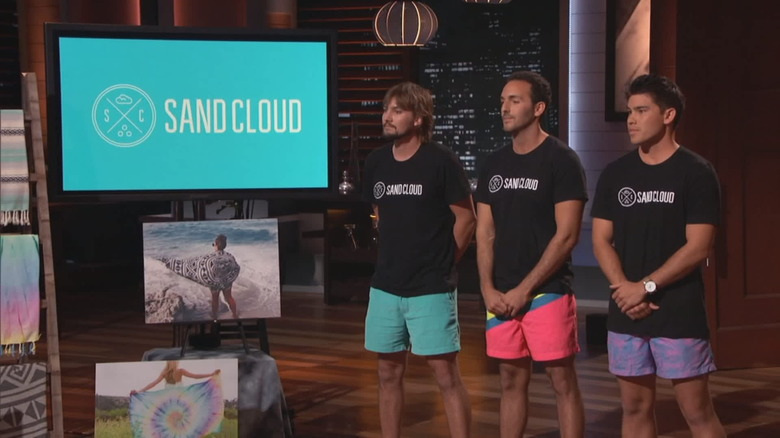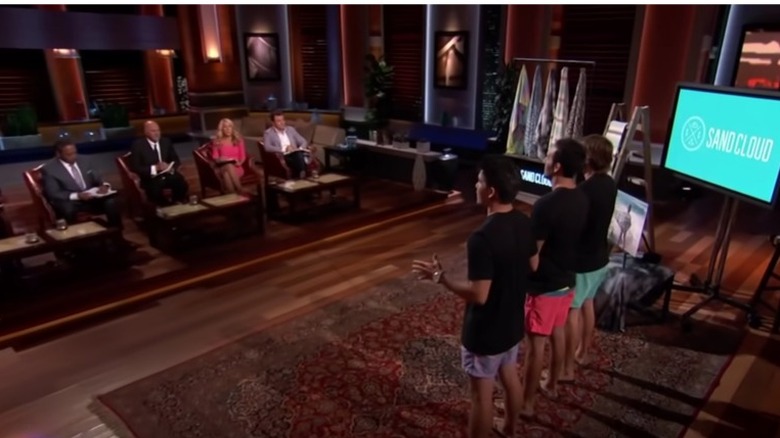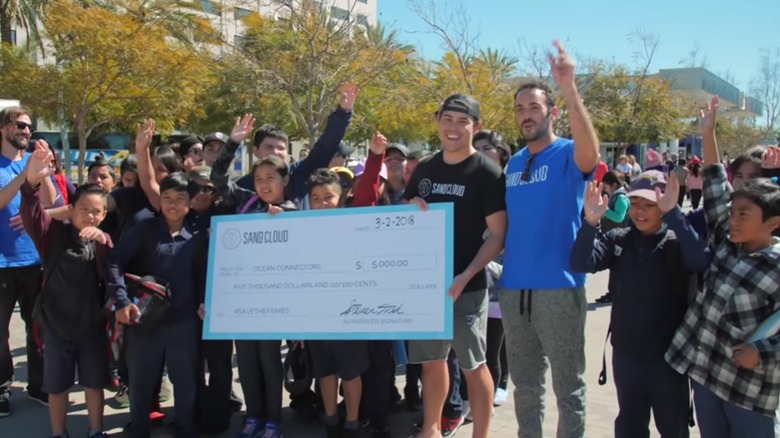What Really Came Of Sand Cloud Beach Towels From Shark Tank?
When Bruno Aschidamini, Brandon Leibel, and Steven Ford of Sand Cloud entered the "Shark Tank" in Season 8 of ABC's hit reality show, they promised to change the common pitfalls of a day at the beach — that often start with the beach towel. Beach towels can suffer from clumping sand that creates a gritty, unsatisfying drying experience. Plus they don't offer much protection from hot sand.
The team had their potential investors in stitches with their cheeky presentation, which superimposed the faces of the sharks on a series of flattering (and not-so-flattering) beach bods, before also capturing the hearts of the tycoons with their company's ecological mission. They make a donation from every purchase to help preserve the planet's oceans and marine life and showed an uplifting video of one of their charity partners releasing four rescued sea lions back into the ocean.
It was a fun pitch, and Sand Cloud boasted an attractive product. Made from top-quality Turkish cotton, their stylish towels come in a range of vibrant patterns and can also work as a wall decoration or item of clothing. The sharks were clearly interested, but the negotiations took a worrying wobble when they started hashing out the numbers.
What happened to Sand Cloud on Shark Tank?
The three co-owners of Sand Cloud wanted $200,000 in return for an 8% slice of their company and the saleability of their product was apparent from the get-go. In stark contrast to the usual boring towel sets or regular beach towels, the Sand Cloud designs were hip, fresh, and the company's donations to worthy ecological causes would likely prove attractive to a young and environmentally conscious market. To top things off, the fine weave of Turkish cotton meant that sand wouldn't clump on the towels, making them far more suitable for the beach.
The entrepreneurs were also looking for a mentor as well as an investment, with the money earmarked for developing and optimizing the website. Mark Cuban, who made his first millions in business software and later bought the Dallas Mavericks, came in with an immediate offer. He put up $400,000 for a 25% stake.
The boys weren't thrilled at the prospect of giving so much away and wanted to hear what the other sharks had to say, prompting Cuban to drop out. They looked crestfallen and things didn't get any better when Daymond John, founder of FUBU hip-hop apparel, seized on the weakness and offered $300,000 for a quarter of the company. A shaky counter-offer made John also drop out, leaving Kevin O'Leary and Robert Herjavec to save the day with identical offers of $200,000 for 15%. Herjavec's experience with another lifestyle product won out and the boys took his offer.
What happened to Sand Cloud after the show?
The three guys from San Diego have come a long way since they quit their jobs and moved in together to start Sand Cloud in 2014. Their appearance on "Shark Tank" drove an immediate spike in interest in their towels, with their website receiving 13,000 hits in one day. Before the show, their highest engagement was a meager 600 hits. They plowed Robert Herjavec's money into improving their website and, true to their word, the company has pledged to donate 10% of every purchase to a variety of ecological charities and foundations. To date, Sand Cloud has donated to a range of causes from the Coral Reef Foundation and the Turtle Hospital to long-established conservation groups like Sea Shepherd, whose fleet of ships protect marine life worldwide.
Since the show, Sand Cloud has expanded its range to offer sunscreen, bags, clothing, and other accessories for a day by the ocean. The company's combination of good deeds and business acumen has also not gone unnoticed. In 2020, Brandon Liebel and Steven Ford made Forbes' 30 Under 30 social entrepreneurs category.
As of 2019, the company had racked up $20 million in sales and returned to "Shark Tank" for the show's 10th-anniversary follow-up on its top 20 best-selling products. Sand Cloud is still going strong today with an active social media presence, just going to show that you can make money with a simple product and help save the planet at the same time.


